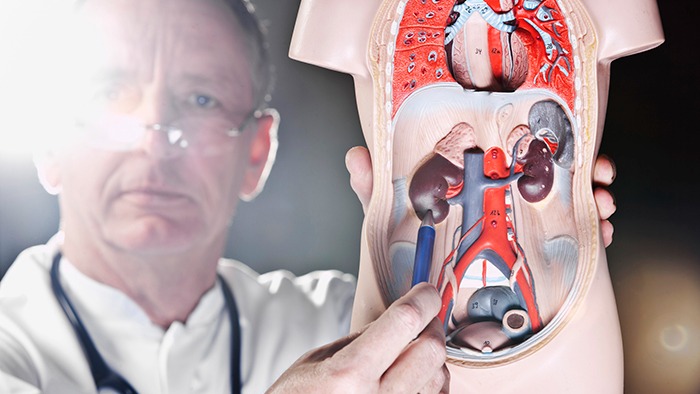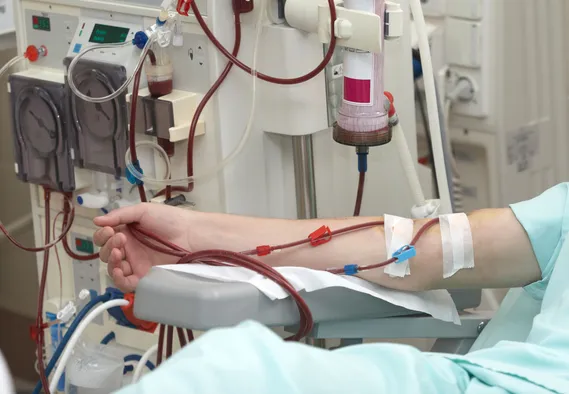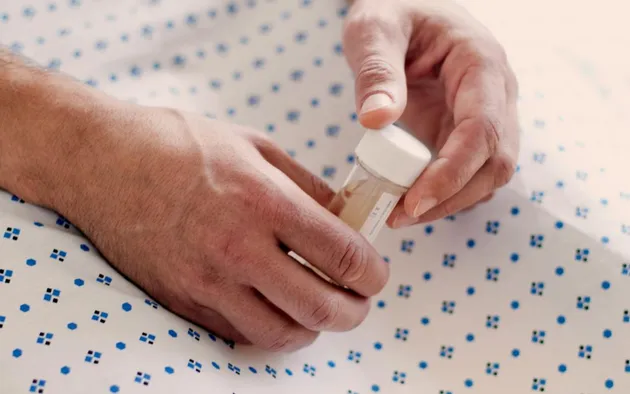Measurement of creatinine in your blood or urine provides clues to help your doctor determine how well the kidneys are working. The more muscle a person has, the more creatinine they produce. Levels of creatinine in the blood reflect both the amount of muscle a person has and their amount of kidney function.
A normal result is 0.7 to 1.3 mg/dL (61.9 to 114.9 µmol/L) for men and 0.6 to 1.1 mg/dL (53 to 97.2 µmol/L) for women.
Most people know that a major function of the kidneys is to remove waste products and excess fluid from the body. These waste products and excess fluid are removed through the urine. The production of urine involves highly complex steps of excretion and re-absorption. This process is necessary to maintain a stable balance of body chemicals.
What is a Kidney?
There are two kidneys, each about the size of a fist, located on either side of the spine at the lowest level of the rib cage. A nephron consists of a filtering unit of tiny blood vessels called a glomerulus attached to a tubule. When blood enters the glomerulus, it is filtered and the remaining fluid then passes along the tubule. In the tubule, chemicals and water are either added to or removed from this filtered fluid according to the body’s needs, the final product being the urine we excrete.

What are the functions of the kidney?
The kidneys are a very important organ in the body. They are two bean-shaped organs, each about the size of a fist, located just below the rib cage, one on each side of your spine. The kidneys are responsible for getting rid of waste products, drugs, and toxins through our urine.
- Kidneys are a special filter system for your body.
- Kidneys remove waste products from the blood and produce urine.
- Kidneys control the levels of many substances in the blood.
- Kidneys help to control your blood pressure.
- Early detection of kidney disease can be life-saving.
What is creatinine?
Creatinine is a waste product that comes from the normal wear and tears on the muscles of the body. Everyone has creatinine in their bloodstream.
Chronic Kidney Disease Symptoms
Early kidney disease is a silent problem, like high blood pressure, and does not have any symptoms. People may have CKD but not know it because they do not feel sick. A person’s glomerular filtration rate (GFR) is a measure of how well the kidneys are filtering wastes from the blood.

Control of blood pressure
The kidneys produce different hormones (renin, angiotensin, aldosterone, prostaglandin etc) which help regulate water and salt in the body, which plays vital roles in the maintenance of good blood pressure control. Disturbances in hormone production and regulation of salt and water in a patient with kidney failure can lead to high blood pressure.
The kidneys maintain the blood creatinine in a normal range. Creatinine has been found to be a fairly reliable indicator of kidney function. Elevated creatinine level signifies impaired kidney function or kidney disease.
There is a difference between looking at creatinine in your bloodstream (called “serum creatinine”) and looking at creatinine in your urine (called “creatinine clearance”). These are two different lab tests. Serum creatinine is part of a routine lab report; creatinine clearance is not.
Is kidney disease reversible?
Acute kidney failure occurs when your kidneys suddenly become unable to filter waste products from your blood. When your kidneys lose their filtering ability, dangerous levels of waste may accumulate, and your blood’s chemical makeup may get out of balance.
Acute kidney failure can be fatal and requires intensive treatment. However, acute kidney failure may be reversible. If you’re otherwise in good health, you may recover normal or nearly normal kidney function.
Blood tests for kidney function
- Serum Creatinine
Creatinine is a waste product that comes from the normal wear and tear on muscles of the body. Creatinine levels in the blood can vary depending on age and body size. A creatinine level of greater than 1.2 for women and greater than 1.4 for men may be an early sign that the kidneys are not working properly.
- Blood Urea Nitrogen (BUN)
Urea nitrogen comes from the breakdown of protein in the foods you eat. A normal BUN level is between 7 and 20. As kidney function decreases, the BUN level rises.
- Glomerular Filtration Rate(GFR)
This test is a measure of how well the kidneys are removing wastes and excess fluid from the blood. It is calculated from the serum creatinine level using age and gender. Normal GFR can vary according to age (as you get older it can decrease)
The normal range of creatinine (for an adult) in the blood is typically:
- U.S. units: 0.84 to 1.21 milligrams per deciliter (mg/dL)
- European units: 74.3 to 107 micromoles per liter (umol/L)
Urine creatinine test

Your doctor may collect a random (single) urine sample for this test, but they’ll more likely request a 24-hour sample. A 24-hour urine sample involves collecting your urine over a period of 24 hours.
The amount of creatinine in the urine can also be used in conjunction with serum creatinine results to calculate your creatinine clearance, which measures how well your kidneys are filtering your blood.

